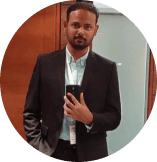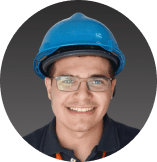Welcome, welcome everyone to our latest interview where we have the pleasure of speaking with Mr. Baher Elsheikh, a distinguished professional with over 20 years of experience in the oil and gas and petrochemical industries. Baher currently serves as the Lead Mechanical Engineer at SABIC in Saudi Arabia. His extensive background encompasses engineering, reliability, construction, commissioning, and inspection management of pressure equipment, piping systems, fired heaters, and power boilers.
Starting his career as a Mechanical Design Engineer at Cairo Oil Refining Company, Mr. Baher has held various senior positions, including Sr. Mechanical Engineer at Methanex Corporation in Egypt. His journey has been marked by hands-on experience and leadership roles, allowing him to build and guide engineering teams to deliver top-tier engineering solutions.
In this interview, Mr. Baher shares insights from his illustrious career, discussing the significant advancements he has witnessed in the industry, his approach to ensuring compliance with standards, and strategies for optimizing reliability and minimizing downtime. He also delves into his leadership philosophy, the importance of staying updated with emerging technologies, and his advice for newcomers to the industry.
Without further ado, let’s begin with our excerpt from the amazing conversation.
Hello Mr. Baher. Hope you’re having an amazing day. Could you introduce yourself to our amazing audience?
Hello! My name is Baher Elsheikh, and I am currently serving as Lead Mechanical Engineer at SABIC in Saudi Arabia. I have over 20 years of experience in the oil and gas and petrochemical industries, specializing in engineering, reliability, construction, commissioning, and inspection management of pressure equipment, piping systems, fired heaters, and power boilers.
My professional journey has taken me through various roles and challenges, allowing me to build and lead engineering teams to deliver top-notch engineering solutions and technical deliverables.
… let’s briefly chat about your journey. You started as a Mechanical Design Engineer and currently, you are the Lead Mechanical Engineer. So how has the entire journey been for you?
The journey has been both challenging and rewarding. I began my career as a Mechanical Design Engineer at Cairo Oil Refining Company, where I gained hands-on experience in detailed engineering for static equipment and piping systems. Over the years, I moved on to more senior roles, including Sr. Mechanical Engineer at Methanex Corporation in Egypt, where I managed MOCs, led the RBI team, and provided technical support.
Now, as the Lead Mechanical Engineer at SABIC, I am responsible for overseeing engineering reviews, leading multi-discipline teams, and providing technical support during plant upsets and shutdowns. Each step has been a learning experience, contributing to my growth and expertise in the field.
… you have been actively working for the past 20 years, what changes have you observed that have made a significant impact on the industry?
Over the past 20 years, I have observed significant advancements in technology and methodologies within the industry. The adoption of digital tools and software for engineering design, reliability analysis, and project management has streamlined processes and improved accuracy. There has also been a stronger emphasis on safety and compliance, with more stringent industry standards and regulations. Additionally, the focus on sustainability and environmental impact has led to the development of more efficient and cleaner technologies in the oil and gas sector.
The social networks over the last years helped in creating many communication and knowledge learning platforms and networking between professionals. And now, I am curios about what AI will do more, it is expected to have significant impact in the industry and the career plans and paths
… how do you approach ensuring compliance with industry standards and regulations in the design and construction of pressure equipment and piping systems?
Ensuring compliance with industry standards and regulations involves a systematic approach. I start by staying updated with the latest standards and regulatory requirements. During the design phase, I ensure that all specifications and calculations adhere to these standards. Throughout the construction phase, I conduct regular inspections and audits to verify compliance. Collaboration with other engineering disciplines and maintaining clear communication with regulatory bodies are also crucial to ensuring that all aspects of the project meet the required standards.
I have learned that, engineers should always keep looking in the standards and specifications and follow the updates. Also for the technical platforms is of great importance to be updated.
… can you share an example of a particularly challenging project you've managed in terms of construction and commissioning? How did you overcome obstacles to ensure successful completion?
One particularly challenging project involved the construction and commissioning of a new pressure equipment system during an emergency shutdown. The tight timeline and unexpected technical issues posed significant challenges. To overcome these obstacles, I led a task force team to conduct a thorough root cause analysis, developed a detailed action plan, and coordinated with all stakeholders to ensure seamless execution. By maintaining clear communication, prioritizing tasks, and leveraging the expertise of the team, we successfully completed the project within the required timeframe and budget.
… what strategies do you employ to optimize reliability and minimize downtime in critical equipment such as fired heaters and power boilers?
To optimize reliability and minimize downtime, a proactive approach is followed including regular maintenance, predictive analytics, and thorough inspections. Implementing a robust Reliability-Centered Maintenance (RCM) program helps identify potential issues before they escalate. Also leverage advanced diagnostic tools and technologies to monitor the condition of critical equipment in real-time. Additionally, to ensure that the team is well-trained and equipped to perform necessary repairs and maintenance efficiently.
… how do you prioritize safety in your engineering projects, particularly in high-risk environments like oil and gas facilities?
Safety is always a top priority in all my engineering projects. I start by conducting comprehensive risk assessments to identify potential hazards. Based on these assessments, I develop and implement detailed safety plans and protocols. Secondly the reliability impact for those projects can resolve reliability issues in the plant or enhance its reliability and consequently production
… could you discuss your approach to leadership and team management in engineering projects, particularly in empowering and motivating your team to deliver exceptional results?
My approach to leadership and team management is centered around empowerment, communication, and collaboration. I believe in providing the team with the necessary resources, training, and support to excel in their roles. Clear communication of project goals and expectations is essential.
I encourage collaboration and the sharing of ideas to foster innovation and problem-solving. Recognizing and rewarding the efforts and achievements of team members also plays a key role in motivating them to deliver exceptional results.
… how do you stay updated with emerging technologies and advancements in the oil and gas industry, and how do you integrate these into your engineering solutions?
Staying updated with emerging technologies and advancements involves continuous learning and networking. I regularly attend industry conferences, workshops, and webinars to learn about the latest trends and innovations. Subscribing to industry journals and publications also helps me stay informed. Integrating new technologies into engineering solutions involves evaluating their feasibility and benefits. Collaboration with technology providers and other industry experts is also crucial in this process. I have a wide network of professionals which is of major importance to me and helps to be always updated and aware of new industry developments.
… can you discuss your experience with quality assurance and quality control processes in the construction and commissioning phases of projects?
Quality assurance and quality control are integral to the success of any project. My experience involves developing and implementing QA/QC plans that outline the standards, procedures, and responsibilities for ensuring quality. During the construction and commissioning phases, regular inspections and audits to verify compliance with these plans shall be conducted.
It is important to ensure that all materials and components meet the specified quality standards. Any deviations are addressed promptly through corrective actions. Documentation and reporting of QA/QC activities are maintained to ensure traceability and accountability.
… how do you foster collaboration and communication among interdisciplinary teams during the design, construction, and commissioning phases of a project?
Fostering collaboration and communication among interdisciplinary teams requires creating a cohesive work environment. I promote regular meetings and workshops where team members can discuss their progress, challenges, and solutions. Clear and consistent communication channels are established to ensure that information flows smoothly between all parties. Using collaborative project management tools also helps in tracking progress and coordinating tasks. Encouraging a culture of respect and mutual support further enhances teamwork and collaboration.
… too many questions about work. Let's take a break. So, how does life look for you outside of work, Mr. Baher?
Outside of work, I enjoy spending time with my family and exploring new hobbies. I am passionate about learning new things and often engage in reading and attending educational courses. I also enjoy outdoor activities and staying active, which helps me maintain a healthy work-life balance.
… do you have any advice for the newbies who are going to enter your industry? Any specific skill that you think they should possess before entering the industry?
My advice for newcomers to the industry is to stay curious and continuously seek knowledge. Technical skills are crucial, but equally important are problem-solving abilities and a proactive mindset. Familiarity with industry standards and regulations is essential. Additionally, developing strong communication and teamwork skills will greatly enhance their ability to succeed in this collaborative field. Embracing new technologies and staying adaptable to changes will also be key to their long-term success.









